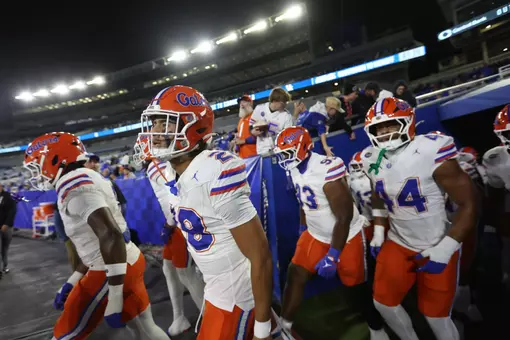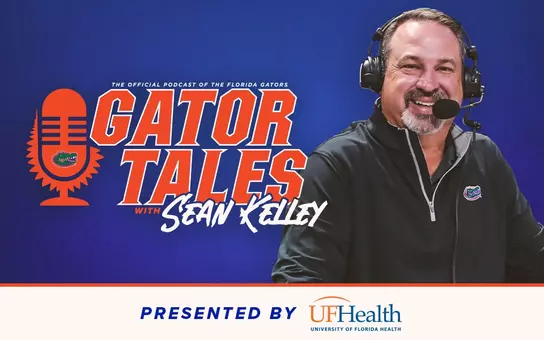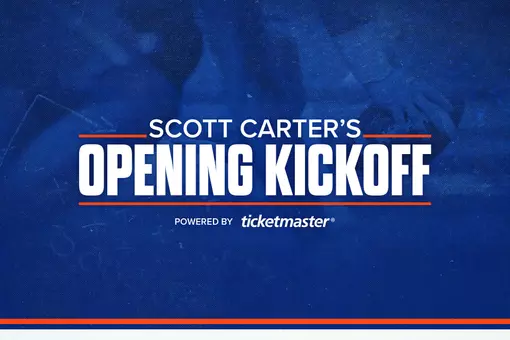Norm Carlson Looks Back.. - Gene Ellenson's Letter
Wednesday, January 21, 2004 | Football

This is written for the countless players, fans, fellow coaches and friends of Coach Gene Ellenson, the master motivator and defensive coordinator for Florida football in the l960s. Over the years so many of them have asked to see a copy of "The Letter" which Ellenson, a World War II hero, wrote to his players on the l962 team, so that's what this article is all about.
Ellenson, the Gators' assistant head coach and defensive coordinator, was a much-decorated hero of World War II who fought in many battles in the European Theatre, including the Battle of the Bulge. He won the Bronze and Silver Star, Purple Hearts and 10 other battlefield decorations while rising to the rank of Captain. He also saw combat in the Korean War.
Ellenson wrote "The Letter" late Thursday night, Oct. 11, l962 and showed it to Florida head football coach Ray Graves the next morning. Graves was enthusiastic about the content. They then addressed the letter to players individually and gave it to them at the usual Friday pre-game meeting.
Why such a drastic step?
"I was desperately trying to think of a way to help our football team," Ellenson said. "We opened the season by beating Mississippi State l9-9, but looked bad the next week when Georgia Tech took us apart 17-0. We played poorly and we knew it. The next week we led Duke at halftime, 21-0, but the last half was a complete reversal. It is inconceivable to blow a 21-0 lead, but we had a humiliating 28-21 loss pinned on us."
The Gators were facing a good Texas A&M team the next Saturday. Loyal Florida fans were disgusted and members of the state media were making fun of the players, coaches and team. Ellenson noted "our kids felt sorry for themselves, and we were as flat as any team I had ever seen."
The players read Ellenson's letter before they boarded the bus to the team motel on Friday night. "They were unusually quiet," he said. "The next morning we took the squad back to Gainesville, fed them their pre-game meal, and got them taped and dressed. Still, there was very little talk or chatter. At two p.m. we kicked off to Texas AM."
Here is the letter each player received the day before that Texas A&M game in l962:
Dear _____ :
It's late at night. The offices are all quiet and everyone has finally gone home. Once again my thoughts turn to you all.
The reason I feel I have something to say to you is because what need now more than anything else are a little guidance and maybe a little starch for your backbone. You are still youngsters and unknowingly, you have not steeled yourselves for the demanding task of 60 full minutes of exertion required to master a determined opponent. This sort of exertion takes two kinds of hardness. Physical, which is why you are pushed hard in practice-and mental, which comes only from having to meet adversity and whipping it.
Now all of us have adversity-different kinds maybe-but adversity. Just how we meet these troubles determines how solid a foundation we are building our life on; and just how many of you stand together to face our team adversity will determine how solid a foundation our team has built for the rest of the season.
No one cruises along without problems. It isn't easy to earn your way through college on football scholarship. It isn't easy to do what is expected of you by the academic and the athletic. It isn't easy to remain fighting when others are curling around you or when your opponent seems to be getting stronger while you seem to be getting weaker. It isn't easy to continue good work when others don't appreciate what you're doing. It isn't easy to go hard when bedeviled by aches, pains and muscle sprains. It isn't easy to rise up when you are down. The pure facts of life are that nothing is easy. You only get what you earn and there isn't such a thing as "something for nothing." When you truly realize this-then and only then will you begin to whip your adversities.
If you'll bear with a little story, I'll try to prove my point. One midnight, January 14, l945, six pitiful American soldiers were hanging onto a small piece of high ground in a forest somewhere near Bastone, Belgium. This high ground had been the objective of an attack launched by 1,000 men that morning. Only these six made it. The others had been turned back, wounded, lost or killed in action. These grimy, cruddy six men were all that were left of a magnificent thrust of 1,000 men. They hadn't had any sleep other than catnaps for over 72 hours. The weather was cold enough to freeze the water in their canteens. They had no entrenching tools, no radio, no food-only ammunition and adversity. Twice a good-sized counter attack had been launched by the enemy, only to be beaten back because of the dark and some pretty fair grenade heaving.
The rest of the time there were incessant mortars falling in the general area and the trees made for dreaded tree bursts, which scatter shrapnel like buckshot. The attackers were beginning to sense the location of the six defenders. Then things began to happen. First, a sergeant had a chunk of shrapnel tear into his hip. Then a corporal went into shock and started sobbing.
After more than six hours of the constant mortar barrage and two close counter attacks, and no food since maybe the day before yesterday, this was some first-class adversity. Then another counter attack, this one making it to the small position. Hand-to-hand fighting is a routine military expression. I have not the imagination to tell you what this is really like. A man standing up to fight with a shattered hip bone, saliva frothing at his mouth, gouging, lashing with a bayonet, even strangling with his bare hands. The lonesome five fought (the corporal was out of his mind) until the attackers quit.
Then the mortars began again. All this time the route to the rear lay open, but never did this little group take the road back. As early dawn a full company of airborne troopers relieved this tiny force. It still wasn't quite light yet. One of the group, a lieutenant, picked up the sergeant with the broken hip and carried him like a baby. The other led the incoherent corporal like a dog on a leash. The other two of the gallant six lay dead in the snow. It took hours for this strange little group to get back to where they had started from 24 hours earlier. They were like ghosts returning. The lieutenant and one remaining healthy sergeant, after 10 hours of sleep and a hot meal, were sent on a mission 12 miles behind the German lines and helped make the link that closed the Bulge.
Today, two of the faithful six lay in Belgium graves, one is a career army man, and one is a permanent resident of the army hospital for the insane in Texas, one is a stiff-legged repairman in Ohio, and one is an assistant football coach at the University of Florida.
This story is no documentary or self-indulgence. It was told to you only to show you that whatever you find adverse now, others before you have had as bad or worse and still hung on to do the job. Many of you are made of exactly the same stuff as the six men in the story, yet you haven't pooled your collective guts to present a united fight for a full 60 minutes. Your egos are a little shook-so what? Nothing good can come from moping about it. Cheer up and stand up. Fight an honest fight, square off in front of your particular adversity and whip it. You'll be a better man for it, and the next adversity won't be so tough. Breaking training now is complete failure to meet your problems. Quitting the first time is the hardest-it gets easier the second time and so forth.
I'd like to see a glint in your eye Saturday about 2 p.m. with some real depth to it-not just a little lip service-not just a couple of weak hurrahs and down the drain again, but some real steel-some real backbone and 60 full fighting minutes. Then and only then will you be on the road to becoming a real man. The kind you like to see when you shave every morning.
As in most letters, I'd like to close by wishing you well and leave you with this one thought. "Self-pity is a roommate with cowardice." Stay away from feeling sorry for yourself. The wins and losses aren't nearly as important as what kind of man you become. I hope I've given you something to think about-and remember, somebody up there still loves you.
Sincerely,
Gene Ellenson
The Gators must have read Ellenson's letter over and over. They beat Texas A&M 42-7, handed unbeaten, fifth-ranked Auburn it's first loss of the season the following week, 22-3, and went on to defeat a great Penn State team, winners of the Lambert Trophy as champions of the east, 17-7 in the Gator Bowl game.
Coach Ellenson passed away on March 17, l995. He is buried in the Florida National Cemetery in Bushnell, Florida.
Norm Carlson recently retired from the University Athletic Association after 40 years of service. Carlson serves as historian for Gator athletics and will contribute a regular column to gatorzone.com.







